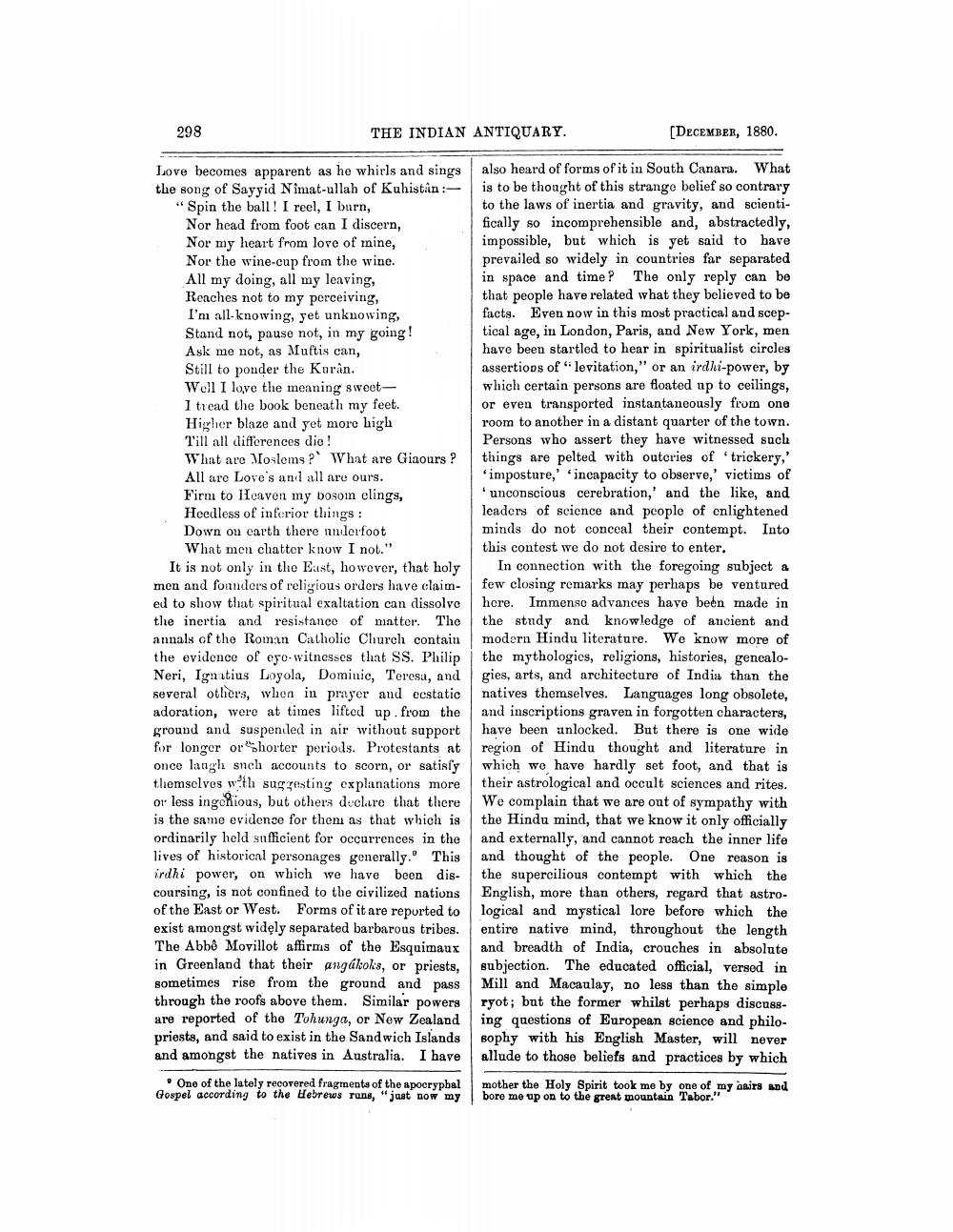________________
298
THE INDIAN ANTIQUARY.
Love becomes apparent as he whirls and sings the song of Sayyid Nimat-ullah of Kuhistan: "Spin the ball! I reel, I burn,
Nor head from foot can I discern, Nor my heart from love of mine, Nor the wine-cup from the wine. All my doing, all my leaving, Reaches not to my perceiving, I'm all-knowing, yet unknowing, Stand not, pause not, in my going! Ask me not, as Muftis can, Still to ponder the Kuran.
Well I love the meaning sweetI tread the book beneath my feet. Higher blaze and yet more high Till all differences die! What are Moslems? What are Giaours ? All are Love's and all are ours.
Firm to Heaven my bosom clings, Heedless of inferior things: Down on earth there underfoot What men chatter know I not." It is not only in the East, however, that holy men and founders of religious orders have claimed to show that spiritual exaltation can dissolve the inertia and resistance of matter. The annals of the Roman Catholic Church contain the evidence of eye-witnesses that SS. Philip Neri, Ignatius Loyola, Dominic, Teresa, and several others, when in prayer and ecstatic adoration, were at times lifted up. from the ground and suspended in air without support for longer or shorter periods. Protestants at once laugh such accounts to scorn, or satisfy themselves with suggesting explanations more or less ingenious, but others declare that there is the same evidence for them as that which is ordinarily held sufficient for occurrences in the lives of historical personages generally." This irdhi power, on which we have been discoursing, is not confined to the civilized nations of the East or West. Forms of it are reported to exist amongst widely separated barbarous tribes. The Abbê Movillot affirms of the Esquimaux in Greenland that their angákoks, or priests, sometimes rise from the ground and pass through the roofs above them. Similar powers are reported of the Tohunga, or New Zealand priests, and said to exist in the Sandwich Islands and amongst the natives in Australia. I have
One of the lately recovered fragments of the apocryphal Gospel according to the Hebrews runs, "just now my
[DECEMBER, 1880.
also heard of forms of it in South Canara. What
is to be thought of this strange belief so contrary to the laws of inertia and gravity, and scientifically so incomprehensible and, abstractedly, impossible, but which is yet said to have prevailed so widely in countries far separated in space and time? The only reply can be that people have related what they believed to be facts. Even now in this most practical and sceptical age, in London, Paris, and New York, men have been startled to hear in spiritualist circles assertions of "levitation," or an irdhi-power, by which certain persons are floated up to ceilings, or even transported instantaneously from one room to another in a distant quarter of the town. Persons who assert they have witnessed such things are pelted with outcries of 'trickery,' 'imposture,' 'incapacity to observe,' victims of 'unconscious cerebration,' and the like, and leaders of science and people of enlightened minds do not conceal their contempt. Into this contest we do not desire to enter.
In connection with the foregoing subject a few closing remarks may perhaps be ventured here. Immense advances have been made in the study and knowledge of ancient and modern Hindu literature. We know more of the mythologies, religions, histories, genealogies, arts, and architecture of India than the natives themselves. Languages long obsolete, and inscriptions graven in forgotten characters, have been unlocked. But there is one wide region of Hindu thought and literature in which we have hardly set foot, and that is their astrological and occult sciences and rites. We complain that we are out of sympathy with the Hindu mind, that we know it only officially and externally, and cannot reach the inner life and thought of the people. One reason is the supercilious contempt with which the English, more than others, regard that astrological and mystical lore before which the entire native mind, throughout the length and breadth of India, crouches in absolute subjection. The educated official, versed in Mill and Macaulay, no less than the simple ryot; but the former whilst perhaps discussing questions of European science and philosophy with his English Master, will never allude to those beliefs and practices by which
mother the Holy Spirit took me by one of my hairs and bore me up on to the great mountain Tabor."




